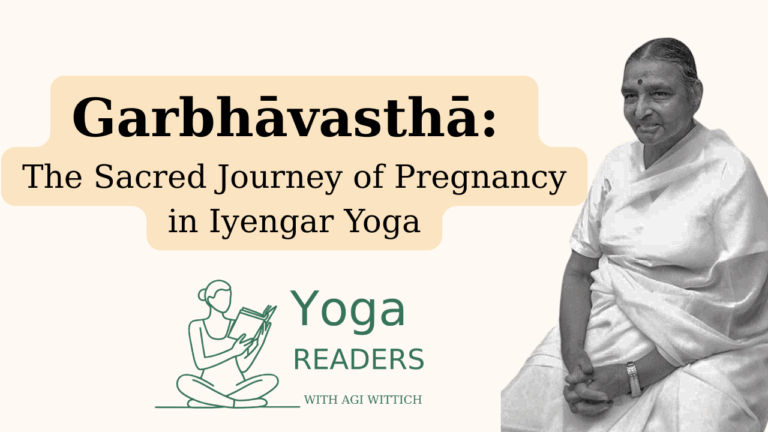
Closing Gathering for Light on Pranayama
Date and Time: May 24, 2026 8am UTC (Coordinated Universal Time) As our Yoga Readers cycle on B.K.S. Iyengar’s Light on Prāṇāyāma comes to completion, we

The moment you discover you’re carrying new life, everything changes. Your body becomes a vessel of creation, your breath sustains two beings, and every movement carries profound responsibility. In “Yoga: A Gem for Women,” Geeta Iyengar offers expectant mothers a sacred roadmap through pregnancy (garbhāvasthā) that honors both the ancient wisdom of yoga and the practical needs of modern women. To explore Geeta Iyengar’s work in depth—especially her specific sequences for pregnancy and other life-stages—visit my overview Yoga a Gem for Women.
Transforming Fear into Confidence
“Normally women are afraid or nervous to do asanas and pranayama during pregnancy,” Geeta acknowledges with characteristic compassion. This fear often stems from well-meaning but misguided advice to “take it easy” during pregnancy. Yet modern research strongly supports what yogic wisdom has long understood: appropriate movement and mindful breathing during pregnancy benefit both mother and child. A comprehensive 2012 study in the Journal of Women’s Health found that prenatal yoga significantly reduced stress, anxiety, and depression while improving physical functioning and birth outcomes. Another landmark study published in Obstetrics & Gynecology (2016) demonstrated that prenatal yoga practice reduced the risk of pregnancy-induced hypertension and intrauterine growth restriction.
The Sacred Architecture of Practice
Geeta’s approach to pregnancy yoga is built on a foundation of precision and reverence. “Your efforts should be directed towards extending your spine,” she instructs. “You should not feel any restriction or interruption in your respiration while performing asanas. In every pose see that the diaphragm is kept soft and free so that breathing becomes easier.” This attention to spinal extension and breath freedom isn’t mere technicality—it’s about creating optimal space for your growing baby while maintaining your own vitality. Research from the International Journal of Yoga (2018) confirms that proper spinal alignment during pregnancy reduces back pain by up to 65% and improves overall quality of life scores. The practice evolves naturally through pregnancy’s seasons. During the first trimester, as Geeta notes, “all asanas can be done except those in Section V.” The second trimester brings focus to “strengthening the muscles of the back and the spine, avoiding pressure on the abdomen.” The third trimester emphasizes creating space and preparing for birth.
Beyond Physical: The Mind-Body-Spirit Connection
Perhaps most profound is Geeta’s understanding of pregnancy’s deeper dimensions: “It is considered that not only the mother’s physical health but her state of mind has a profound effect on the unborn child. The foundation is laid in the womb itself for the child to develop on a morally and spiritually higher plane.” This ancient wisdom finds remarkable validation in modern research. Studies in Developmental Psychology (2019) show that maternal stress hormones cross the placental barrier, directly affecting fetal brain development. Conversely, practices that promote maternal calm—like yoga and meditation—create an optimal neurochemical environment for fetal development. Read how Geeta integrates Ayurvedic principles like doṣa‑balance and metabolism into pregnancy yoga in my post on The Three Doṣas.
Dr. Catherine Monk’s groundbreaking research at Columbia University demonstrates that babies born to mothers who practiced yoga during pregnancy show improved self-regulation and reduced stress reactivity in their first months of life. The benefits extend beyond birth: children of mothers who practiced prenatal yoga show enhanced cognitive development and emotional resilience well into early childhood.
Practical Wisdom for Daily Life
Geeta’s guidance addresses the real challenges pregnant women face: “The asanas mentioned here are simple to perform. They are not complicated, nor in any way dangerous. They are designed to keep the expectant mother healthy so that she can avoid the usual warning signals such as vomiting, morning sickness, constipation, swelling, headache, toxaemia.”
Modern research validates these claims extensively. A 2020 meta-analysis in Birth journal found that prenatal yoga significantly reduced common pregnancy discomforts:
The breathing practices (pranayama) hold particular power. As Geeta explains, “The practice of these pranayama minimises the spasms and strains during labour and facilitates the easy expulsion of the child.” Research published in Midwifery (2019) confirms that women who practiced prenatal yoga had shorter labor durations and required fewer medical interventions during delivery. Want practical strategies rooted in Ayurveda and Iyengar yoga? Check out my session Ayurveda & Iyengar Yoga for Women.
The pregnancy journey offers profound lessons about adaptation, trust, and the wisdom of the feminine body. These themes extend throughout all phases of a woman’s life, each requiring its own understanding and approach. If you’re interested in exploring how Iyengar yoga supports women through all life transitions—from menarche to menopause—you can learn more in my comprehensive lecture ‘Aligning with Change: Iyengar Yoga’s Adaptations for Women’s Life Cycles
Individualization: Honoring Your Unique Journey
Geeta emphasizes repeatedly that “Individual problems and constitutions vary from person to person. It is impossible to give a specific programme to suit the needs of every individual woman.” This personalized approach is crucial—what serves one woman may not serve another.
She provides clear indicators for appropriate practice intensity: “A feeling of radiant health after practice is a sign that one is working correctly; if one feels tired or exhausted, either the practice is faulty or one has over-done it.”
Modern research supports this intuitive approach. Studies show that women who practice body awareness techniques during pregnancy develop enhanced interoception—the ability to sense internal bodily signals. This heightened awareness helps them make better decisions about movement, rest, and nutrition throughout pregnancy. I discuss how to adapt your practice mindfully—balancing discipline and intuition—in The Path of Discipline and Adaptation.
Reflection: How does my body feel after different types of movement or breathing? What is my body telling me about what it needs today?
Preparing for Birth and Beyond
The practice serves as preparation not just for pregnancy but for the profound transition into motherhood. Geeta notes that proper practice “makes delivery easy as the mother knows the right type of relaxation. It restores the mother’s energy soon after delivery.”
Clinical studies support these observations. Research in the Journal of Alternative and Complementary Medicine (2017) found that women who practiced prenatal yoga had:
Creating Sacred Space in Daily Life
The Iyengar approach transforms routine into ritual. Even simple poses become opportunities for connection with your baby. As you place your hands on your growing belly in supported child’s pose, you’re not just stretching your back—you’re creating a moment of communion with the life within.
Geeta’s instructions for Savasana during pregnancy are particularly beautiful: “Place a pillow lengthwise from the waist to the head so that the chest remains at the same level as the abdomen, or a little higher… In this position the body is in a descending plane from the head to the pelvis, avoiding tension in the head and heaviness in the chest, and facilitating breathing.”
This isn’t just about comfort—it’s about creating optimal conditions for both relaxation and connection with your baby.
Reflection: How can I create moments of sacred connection with my baby throughout my daily routine? What would it feel like to approach each day of pregnancy as an opportunity for deeper communion?
The Legacy We Create
Perhaps most beautiful is Geeta’s vision of pregnancy as a foundation for future generations: “The foundation is laid in the womb itself for the child to develop on a morally and spiritually higher plane.” When we practice with consciousness during pregnancy, we’re not just caring for ourselves—we’re contributing to our child’s lifelong capacity for well-being.
Research in epigenetics confirms this profound truth. Maternal practices during pregnancy can influence gene expression in ways that affect the child’s lifelong health, stress resilience, and even spiritual capacity for peace and connection.
An Invitation to Trust
Geeta Iyengar’s approach to pregnancy invites us to trust both ancient wisdom and our own inner knowing. “Individual problems and constitutions vary from person to person,” she reminds us, encouraging a relationship with our practice based on deep listening rather than rigid rules.
As you move through your pregnancy, remember that each breath is shared, each movement creates space for growth, and each moment of mindfulness is a gift to both you and your child. You are not just growing a baby—you are participating in the sacred work of bringing consciousness into the world.
Final Reflection: How has my understanding of strength, patience, and surrender evolved through pregnancy? What gifts am I already receiving from this journey that I want to remember and carry forward into motherhood?
The wisdom of “Yoga: A Gem for Women” reminds us that pregnancy is not a condition to endure but a sacred journey to embrace. Through mindful practice, we prepare not just our bodies for birth but our hearts for the profound transformation of becoming mothers.
☕ Appreciate this work? Buy Me a Chai – your support helps me keep offering free content to the yoga community.

Date and Time: May 24, 2026 8am UTC (Coordinated Universal Time) As our Yoga Readers cycle on B.K.S. Iyengar’s Light on Prāṇāyāma comes to completion, we

A global reading journey with B.K.S. Iyengar’s classic on the yogic art of breathing January – May 2026 on Sundays 8am UTC (Coordinated Universal

Date and Time: January 18, 2026 8am UTC (Coordinated Universal Time) In this new Yoga Readers cycle we will be reading B.K.S. Iyengar’s Light on
Agi Wittich is a yoga practitioner since two decades, and is a certified Iyengar Yoga teacher. Wittich studied Sanskrit and Tamil at the Hebrew University of Jerusalem, Israel, completing a PhD with a focus on Hinduism, Yoga, and Gender. She has published academic papers exploring topics such as Iyengar yoga and women, the effects of Western media on the image of yoga, and an analysis of the Thirumanthiram yoga text.